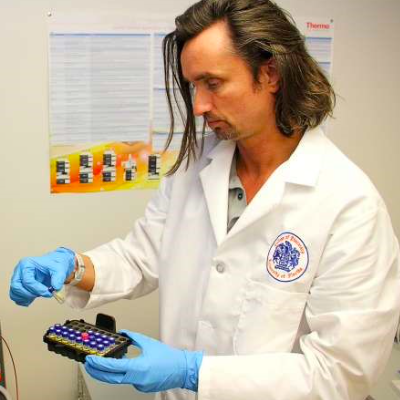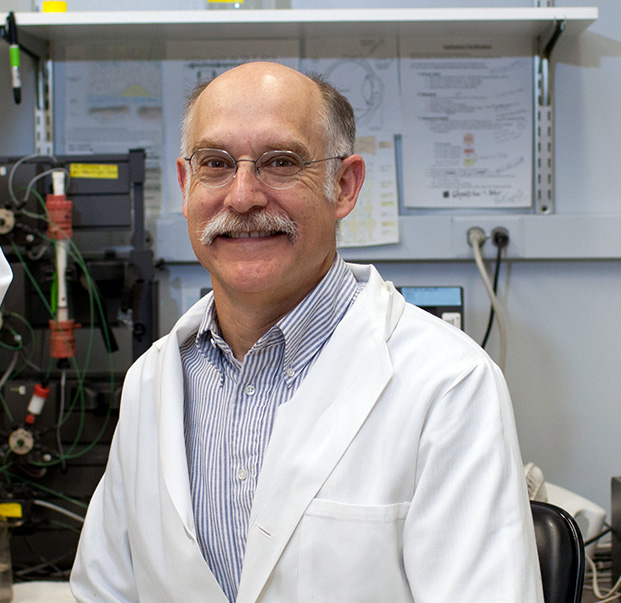

Research Terms
Center for Natural Products, Drug Discovery and Development
| Director |
Hendrik Luesch |
| Phone | (352) 273-7738 |
| Website | https://cnpd3.pharmacy.ufl.edu |
| Mission | The Center for Drug Discovery was established to provide a strong multidisciplinary approach to research, involving faculty in Medicinal Chemistry, Pharmaceutics and Pharmacodynamics in the College of Pharmacy; Endocrinology, Metabolism, Infectious Disease, Pharmacology, and Opthalmology in the College of Medicine; and the VA Hospital at the University of Florida. Important components include a computer-assisted drug design group, design of new drugs based on retrometabolic concepts, as well as synthetic, analytical, pharmacokinetic and pharmacodynamic programs. |
This molecular antagonist has been shown to prevent morphine-seeking behavior in animals and may be an effective treatment for opioid addiction in humans . The Center for Disease Control and Prevention estimates that opioid prescription misuse accounts for $78.5 billion in economic burden, and in 2019 alone, nearly 50,000 people died from opioid overdoses. , Medication-assisted treatment is effective in helping combat opioid addiction. However, only a handful of medications are available to treat opioid addiction, and more effective treatments are needed to help address the opioid crisis.
Researchers at the University of Florida have developed a small complex molecule that may be an effective treatment for opioid addiction. This molecule is part of a larger chemical library that contains architecturally diverse molecules that may also be useful as anticancer, antibacterial, and antimalarial drug candidates.
Small complex molecule that is an antagonist for the receptor associated with opioid addiction and may be an effective opioid addiction treatment
Medication-assisted treatment is an effective method for combating opioid addiction, but only a few drugs are available for use. This molecular antagonist binds to the HCRTR2 receptor and may be an effective treatment for opioid addiction. This molecule is part of a larger library of chemical architectures derived from the indole alkaloid, Vincamine. Other molecules in the library may be anticancer, antibacterial, and antimalarial drug candidates.
This microtubule-destabilizing agent, derived from a marine cyanobacterium, targets a new seventh tubulin-binding site and inhibits cancer cell growth. Tubulin-targeting chemotherapy is a proven successful and wide-spectrum strategy against multiple solid and liquid malignancies. In 2019, the United States reported over 1.7 million new cancer cases, leading to approximately 600,000 deaths. In 2021, the chemotherapy drug market had a value of $42.9 million and could reach $89 million by 2029. Previously, known tubulin-targeting agents bind to six sites at the α/β-tubulin heterodimer, leading to microtubule depolymerization or stabilization. Available microtubule-destabilizing compounds are frequently toxic. Since anticancer efficacy and the pharmacological effects vary depending on the chemical scaffold and binding sites, there is a continued demand for new microtubule-targeting agents against novel binding sites.
Researchers at the University of Florida have discovered gatorbulin-1 (GB1), a new microtubule-destabilizing cyclodepsipeptide that binds to a new seventh binding site near the colchicine site. Derived from a marine cyanobacterium, GB1 may lead to a treatment method for patients suffering from or susceptible to proliferation diseases or disorders, such as cancer, providing treatments with lower toxicity.
Gatorbulin-1 (GB1), a microtubule-destabilizing agent, targets and binds to a new seventh tubulin-binding site, inhibiting cancer cell proliferation
Gatorbulin-1 (GB1), a microtubule-destabilizing cyclodepsipeptide derived from a marine cyanobacterium, presents a distinct chemotype and binds to a seventh microtubule pocket situated between α- and β-tubulin, near the colchicine site. Through binding to this new site, GB1 destabilizes microtubule formation through a wedging mechanism. Tubulin is a crucial target for the development of chemotherapeutics, so targeting it yields increased drug screening possibilities and the development of safer and more effective cancer treatment options, alone or as an antibody-drug conjugate (ADC).

















































































































